Grigori Yefimovich Rasputin (Russian: Григорий Ефимович Распутин, IPA: [ɡrʲɪˈɡorʲɪj jɪˈfʲiməvʲɪtɕ rɐˈsputʲɪn]; baptized on 22 January [O.S. 10 January] 1869 – murdered on 30 December [O.S.17 December] 1916[1]) was a Russian peasant, mystic and private adviser to the Romanovs, who became an influential figure in the later years of tsar Nicholas. This was especially the case after August 1915[2] when the Emperor left Petrograd for Stavka at the front, leaving his wife Alexandra Feodorovna to act in his place. Some people—then and now—believe that Rasputin's personal influence over the Tsarina became so great that it was he who ordered the destinies of Imperial Russia, while she compelled her weak husband to fulfill them.[3]
Rasputin was neither a monk nor a saint; he never belonged to any order or religious sect.[4] He was considered a strannik ("pilgrim"), wandering from cloister to cloister. He was obsessed by religion[5] and impressed many people with his knowledge and ability to explain the Bible in an uncomplicated way.[6][7][8][9] It was widely believed that Rasputin had a gift for curing bodily ailments. In 1907, Rasputin was invited by Nicholas and Alexandra Feodorovna to heal their only son, tsarevich Alexei, who suffered from hemophilia. "In the mind of the Tsarina Rasputin was closely associated with the health of her son, and the welfare of the monarchy."[10]
Rasputin was regarded as a starets ("elder") by his followers, who also believed him to be a psychic and faith healer.[11] His critics referred to him by the same term in an ironic fashion. He never considered himself to be a starets.[12] Rasputin spoke an almost incomprehensible Siberian dialect[13] and never preached or spoke in public.[14] The Tsarina saw Rasputin as a "Man of God" and clairvoyant,[13] but his enemies saw him as a debauched religious charlatan and a lecher. Brian Moynahan describes him as "a complex figure, intelligent, ambitious, idle, generous to a fault, spiritual, and - utterly- amoral."[15] He was an unusual mix, a muzhik, prophet and at the end of his life a party-goer.[16]
Rasputin began as a symptom[clarification needed] of the royal family's isolation from the public; he ended by deepening that isolation to an unbridgeable chasm.[17] While his influence and role may have been exaggerated, historians agree that his presence played a significant part in the increasing unpopularity of the Tsar and his wife immediately prior to the February Revolution of 1917.[18] The conspirators, who did not accept a peasant being so close to the Imperial couple, had hoped that Rasputin's removal would cause the Tsarina to retreat from political activities. They also believed that Rasputin was an agent of Germany, but he was more of a pacifist, opposed to all wars.[19]
There is much uncertainty over Rasputin's life and influence, as accounts are often based on dubious memoirs, hearsay and legend.[11] Colin Wilson said in 1964 that "No figure in modern history has provoked such a mass of sensational and unreliable literature as Grigory Rasputin. More than a hundred books have been written about him, and not a single one can be accepted as a sober presentation of his personality. There is an enormous amount of material on him, and most of it is full of invention or wilful inaccuracy. Rasputin's life, then, is not 'history'; it is the clash of history with subjectivity."[20]
In Russia, Rasputin is seen by many ordinary people and clerics, among them the late Elder Nikolay Guryanov, as a righteous man.[21] However, Alexy II of Moscow said that any attempt to make a saint of Rasputin would be "madness".[22]
Contents
[show]Early life
Grigory Rasputin was born the son of a well-to-do peasant in the small but prosperous village of Pokrovskoye in the Tobolsk guberniya (now Yarkovsky District in the Tyumen Oblast) in the immense West Siberian Plain. The parish register contains the following entry for January 9, 1869: “In the village of Pokrovskoe, in the family of the peasant Yefim Yakovlevich Rasputin and his wife, both Orthodox, was born a son, Grigory.”[24][25] The next day he was baptized and named after Gregory of Nyssa, whose feast day is on 10 January.[26]
Grigory was the fifth of nine children. He never attended school; according to the census of 1897 almost everybody in the village was illiterate.[27] In Pokrovskoye the young Rasputin was regarded as an outsider, but one endowed with mysterious gifts. "His limbs jerked, he shuffled his feet and always kept his hands occupied. Despite physical tics, he commanded attention."[28] The little that is known about his childhood was passed down by his daughter Maria.[29] On February 2, 1887, Rasputin married the three-years-older Praskovia Fyodorovna Dubrovina. The couple had three children: Dmitri, Varvara and Maria; two earlier sons died young. In 1892 [30] Rasputin abruptly left his village, his wife, children and parents. He spent several months in the famous Verkhoturye monastery; Spiridovich suggests after the death of a child.[31] Not far from the monastery lived a monk by the name of Brother Makary. Makary had a strong influence on Rasputin, which lead to Grigory giving up drinking, smoking, eating meat. When he arrived home he had learned to read and write and had become a zealous convert.
Rasputin's claimed vision of Our Lady of Kazan turned him towards the life of a religious mystic. Around 1893 he travelled to Mount Athos, but left shocked and profoundly disillusioned, as he told Makary.[32] By 1900 he was identified as a strannik,[33] although it seems that Rasputin always went home to help his family with the harvest. In 1903 he spent some time in Kiev where he visited the Monastery of the Caves. In Kazan he attracted the attention of the bishop and members of the upper class.[34] Rasputin then walked to the capital to meet with John of Kronstadt, a famous healer. Pierre Gilliard writes that Rasputin arrived in 1905,[35] M. Nelipa thinks Autumn 1904, Iliodor believed it was already in December 1903.[36] He carried an introduction to Ivan Stragorodsky, the rector of the Theological Faculty.[37] Rasputin stayed at Alexander Nevsky Lavra; there he met with Hermogenes and Theophanes of Poltava who was amazed with his psychological perspicacity. He was invited by Milica of Montenegro and her sister Anastasia, who were interested in Persian mysticism,[38] spiritism and occultism. Milica presented Rasputin to tsar Nicholas and his wife Alexandra on 1 November 1905 (O.S.).[39]
Prior to his meeting with Rasputin, the Tsar had had to deal with the Russo-Japanese War, Bloody Sunday, the Revolution of 1905, bombs and a nation-wide railway strike. In a city without electricity the Emperor and Autocrat of All the Russias was forced on the 17th by Sergei Witte to sign the October Manifesto, to agree with the establishment of the State Duma and give up part of his unlimited autocracy.[40]
Healer to Alexei
In October 1906, at the request of the Tsar, Rasputin paid a visit to the wounded daughter of Prime Minister Pyotr Stolypin. A few weeks before, 29 people had been killed after a bomb attack, including one of Stolypin's children.[41] A few months later,
... on December 15, Rasputin petitioned the Tsar, seeking to legally change his name. Grigory explained that six families in Pokrovskoye bore the surname Rasputin, and this was producing "every sort of confusion." Rasputin asked Nicholas "to end this confusion by permitting me and my descendants to take the name Rasputin-Novyi (Новый)," which means "Rasputin-New" or the "New Rasputin."[42][43]
In April 1907 Rasputin was invited again to Tsarskoye Selo, this time to see tsarevich Alexei. The boy had received an injury which caused him painful bleeding. It was not publicly known that the heir to the throne had hemophilia, a disease that was widespread among European royalty. When doctors could not supply a cure, the desperate Tsarina looked for other help; she had losther mother, her brother, her younger sister when she was young. Rasputin was said to possess the ability to heal through prayer and was able to calm the parents and to give the boy some relief, in spite of the doctors' prediction that he would die. On the following day the Tsarevich showed significant signs of recovery.[44][45]
In early October 1912, during a particularly grave crisis in Spała, in Russian Poland, the Tsarevitch received the last sacrament. The desperate Tsarina turned to her best friend, Anna Vyrubova,[46] to secure the help of the peasant healer, who at that time was out of favor. The next day, on 9 October Rasputin responded and sent a short telegram, including the prophecy: "The little one will not die. Do not allow the doctors to bother him too much."[47] Alexandra, like Rasputin obsessed with religion,[13] believed that he had cured her son through the power of prayer.[48]
It has been claimed that Rasputin's apparent healing powers arose from his use of hypnosis, but Rasputin was not interested in this practice before 1913 and his teacher was expelled from St. Petersburg.[49] Rasputin's enemies suggested that he secretly drugged Alexis[13] with Tibetan herbs which he got from the quack doctor Badmayev. For Maria Rasputin it was magnetism.[50]For Greg King these explanations fail to take into account those times when Rasputin healed the boy, despite being 2600 km (1650 miles) away. For Fuhrmann these ideas on hypnosis and drugs flourished because the imperial family lived such isolated lives.[51] (They lived almost as much apart from Russian society as if they were settlers in Canada.[51]) For Moynahan, "There is no evidence that Rasputin ever summoned up spirits, or felt the need to; he won his admirers through force of personality, not by tricks."[52]
Controversy
Even before Rasputin's arrival the upper class of St Petersburg had been widely influenced by mysticism. Individual aristocrats were reportedly obsessed with anything occult.[53] Papus had visited Russia three times, in 1901, 1905, and 1906, serving the Tsar and Tsarina both as physician and occult consultant.[54] According to Lili Dehn Rasputin visited the palace (allowed to take a side-door and avoiding all the security measures) once a month.[13] While fascinated by Rasputin, favoured by the Emperial family, the ruling class of St Petersburg became envious and turned against him. Around 1910 the press started a campaign against Rasputin. In the next year the strannik supposedly went on a trip for a few months. He sailed to Constantinople, Patmos, Cypres and Beirut. Around Easter 1911 he paid a visit to the Holy Land.[55]
In early 1912 Hermogen started rumours that Rasputin had joined the Khlysty, an obscure Christian sect with strong Siberian roots. Similar charges had already been investigated in September 1907, but proved to be a false.[56] Iliodor, hinting that Alexandra and Rasputin were lovers, showedMakarov a satchel of letters, one written by the Tsarina and four by her daughters.[57] The stolen[58] letters were given to the Tsar.[59] Rodziankorequested Rasputin to leave the capital.[60] When Vladimir Kokovtsov became prime minister he asked the Tsar to authorize Rasputin's exile toTobolsk. Nicholas refused; "I know Rasputin too well to believe all the tittle-tattle about him."[61] Kokovtsov had offered Rasputin 200,000 rubles, a substantial amount of money, and ordered the newspapers not to mention his name in connection with the Empress. Alexandra became sick and refused to meet with Rasputin for a period of time. Rasputin had become one of the most hated people in Russia [62] and was under surveillance day and night.[63]
There is little or no proof that he was a member of the Khlysty,[65] but Rasputin does appear to have been influenced by their practices.[66] He accepted some of their beliefs, for example those regarding sin as a necessary part of redemption.[67] One of the sect's practices was known as "rejoicing" (радение), a ritual which sought to overcome human sexual urges by engaging in group sexual activities. He believed that those deliberately committing fornication and then repenting bitterly, would be closer to God.[68]Suspicions that Rasputin, a good dancer,[63][69] was one of the Khlysty tarnished his reputation right until the end of his life. Recently found documents (a 500-page document archive provided by Mstislav Rostropovich and investigated by Edvard Radzinsky)[70] suggest that accusations about Rasputin's sexual dissoluteness were false.[71] The basis for the denunciation of Rasputin as a Khlyst was mixed bathing, a perfectly usual custom among the peasants of many parts of Siberia.[72][73]
He had ... survived public scandal, allegations of rape and lewdness, the criticism of two prime ministers, the contempt of the Duma, the hatred of churchmen, and a vitriolic press campaign - all before he was called on as a last resort to save the heir.[74]
After the Spala accident, when the Tsarevich fell and became seriously ill,[75] Rasputin regained influence at court and also in church affairs. His position as an intermediary had been dramatically validated.[76] An attempt was made to push through the Synod an authorization to ordain Rasputin a priest,[51] but the Holy Synod frequently attacked Rasputin, accusing him of a variety of immoral or evil practices. Rasputin was variously accused of being a heretic, an erotomaniac or a pseudo-khlyst.[77] On 21 February 1913 Rodzianko ejected Rasputin from the Cathedral of Our Lady of Kazanshortly before the celebration of 300 years of the Romanov rule over Russia. He had established himself in front of the seats which Rodzianko, after great difficulty, had secured for the Duma.
Rasputin's behaviour was discussed in the Fourth Duma,[78] and in March 1913 the Octobrists, led by Alexander Guchkov and President of the Duma, commissioned an investigation.[79][80] Worried with the threat of a scandal, the Tsar asked Rasputin to leave for Siberia. Nicholas accepted investigations on Rasputin being a Khlyst,[81] but quickly decided to criticize the politicians [82] and the investigations were stopped by the Tsarina.[13][51][83] He and his wife referred to Grigori as our "Friend" and a "holy man", emblematic of the trust that the family had placed in him. "Anyone bold enough to criticize Rasputin found only condemnation from the Tsarina."[10] The Tsar dismissed Kokovtsov on 29 January 1914 for a "lack of control over the press".[84]
At first sight Rasputin looks like a symbol of decadence and obscurantism, of the complete corruption of the imperial court in which he was able to float to the top. And so he has usually been treated in the history books. The temptation to wallow in the rhetoric of the lower depths in describing him is almost irresistible. And yet the truth is somewhat simpler: Rasputin was only able to play the part he did because of the dispersal of authority which very much deepened after Stolypin's death, and because of the bewildered and unhappy isolation in which the royal couple found themselves.[85]
Assassination attempt
In 1914 Rasputin travelled with his father, who had been visiting him, from the capital to Pokrovskoye.[86] After dining on the afternoon of Sunday 12 July [O.S. 29 June] 1914,[87][88][89] Rasputin went out from the house and was suddenly attacked by one Khionia Guseva. This woman with an affected nose and her face concealed with a black kerchief approached him, and then jerked out a dagger.[90] She stabbed Rasputin in the stomach, just above the navel, exposing his entrails. Rasputin fell, covered with blood and was brought into his house. After ten hours a doctor arrived and operated on him in the middle of the night. On 3 July, Rasputin was transported by boat to Tyumen for treatment, accompanied by his family. The Tsar sent his own physician[91] and after a laparotomy and almost seven weeks in the hospital, where he had to walk around in a gown, unable to wear ordinary clothes,[92] Rasputin recovered.[93] On August 17, 1914 Rasputin, who believed Iliodor and Vladimir Dzhunkovsky had organized the attack,[63][94] left the hospital, but his daughter Maria records that he was never the same man afterwards.[95][96]
After the attack, the former monk Iliodor, once a leader in the Union of the Russian People, fled all the way around the Gulf of Bothnia to Oslo. Gusseva, a fanatically religious woman, had been his adherent in earlier years "denied Iliodor's participation, declaring that she attempted to kill Rasputin because he was spreading temptation among the innocent."[97] The local procurator decided to suspend any action against him for undisclosed reasons [98] and Guseva was locked up in a madhouse in Tomsk.
Most of Rasputin's enemies had by now disappeared. Stolypin was dead, Count Kokovtsov fallen from power, Theofan exiled, Hermogen illegally banished and Iliodor in hiding.[99]
Yar restaurant incident
On 25 March 1915 (O.S.) Rasputin left for Moscow by train, accompanied by his guards. On the next evening he is said to have opened his trousers and waved his genitals in front of shocked diners at the Moscow Yar restaurant whilst inebriated.[100][101] It has been claimed that this story was fabricated by Dzhunkovsky in order to discredit Rasputin.[102] A Moscow governor and Stepan Beletsky verified that Rasputin never visited the Yar restaurant. According to Nelipa he was petrified of going to an unknown restaurant, and partying with an 78-year-old woman with whom he stayed in Moscow and only left her house to attend a church is not very credible. The police did not interview any witness in the restaurant; an unreliable report was presented a few months later. Another explanation is from Tatyana Mironova.[103] She came up with a Rasputin look alike.
World War I
During the Second Balkan War, when the Bulgarians had decided to go to a war with Serbia, the Tsar tried to stop the upcoming conflict, since Russia did not wish to lose either of its Slavic allies in the Balkans. Rasputin warned the Tsar not to get involved and promoted peace negotiations in 1913. It seems Rasputin became the enemy of Grand Duke Nicholas, a panslavist, his brother Peter and their wives Milica and Anastasia of Montenegro, eager to go in war.[104][105]
According to Pavel Milyukov, in May 1914 Rasputin had become an influential factor in Russian politics.[106] Shortly before the outbreak of World War I, Rasputin spoke out against Russia going to war with Germany. He begged the Tsar to do everything in his power to avoid war.[107] From the hospital Rasputin sent quite a few telegrams to the court expressing his fears on the future of the country. "If Russia goes to war, it will be the end of the monarchy, of the Romanovs and of Russian institutions."[108] The belligerent countries expected the war would last till Christmas, but after a year the situation at the Eastern front had become disastrous: more than 1,5 million Russian soldiers had died. When the German army occupied Warsaw in August 1915 the situation looked extremely grave, because of a shortage in weapons and munition due to bad train connections. As a result the Russian army had to withdraw (Great Retreat). Vladimir Sukhomlinov left on charges of abuse of power and treason. There was a shortage of food and high prices and the Russian people blamed all on "dark forces" or spies for and collaborators with Germany; in May 1915 shops in Moscow, owned by foreigners, were attacked.[109]
On the eve of the war the government and the Duma were hovering round one another like indecisive wrestlers, neither side able to make a definite move.[110] The war made the political parties more cooperative and practically formed into one party. When the Tsar announced his departure for the front in Mogilev, the Progressive Bloc was formed, fearing Rasputin's influence over tsarina Alexandra would increase.[111] Alexandra hated the Duma because of its discussion of Rasputin.[112] On August 19, 1915, after an unsuccessful attempt to discredit Rasputin and the Tsarina in a newspaper, prince Vladimir Orlov [13] and Vladimir Dzhunkovsky were discharged from their post. The Tsar then pronounced the affair between Rasputin and the Romanovs to be a private one, closed to debate.[113]
Tsar Nicholas took supreme command of the Russian armies on August 23, 1915 (O.S.), hoping this would lift morale. He was undoubtedly led to this fateful decision by the insistence of the Tsarina and of Rasputin.[114] "Having one man in charge of the situation would consolidate all decision making."[115] However, there proved to be dire consequences for himself as well as for Russia. All the ministers, even Ivan Goremykin, realized that the change would put Rasputin in charge and threatened to resign.[116] The Emperor got rid of those of his Ministers who were at best half-hearted about the war, Ivan Shcheglovitov and Vladimir Sabler, as the head of the Holy Synod, and replaced them by men who had the confidence of the country.[51] In September theDuma was sent into recess and would not gather again till February 1916. Vasily Maklakov published his famous article, describing Russia as a vehicle with no brakes, driven along a narrow mountain path by a "mad chauffeur", a reference to the Tsar.[117]
Government
While seldom meeting with Alexandra personally after the debate in the Duma, Rasputin had become her personal adviser through daily telephone calls or meetings with Vyroubova. According to Fuhrmann a symbiotic relationship developed between the Tsarina and Rasputin, in which "each fed from the other".[119] According to Pierre Gilliard "her desires were interpreted by Rasputin, they seemed in her eyes to have the sanction and authority of a revelation."[120] Alexandra then persuaded her husband that all the ministers who had, so to speak, struck work against Premier Goremykin should be replaced as soon as possible.[51]
| “ | The Tsar had resisted the influence of Rasputin for a long time. At the beginning he had tolerated him because he dare not weaken the Tsarina's faith in him - a faith which kept her alive. He did not like to send him away, for if Aleksey Nicolaievich had died, in the eyes of the mother he would have been the murderer of his own son.[121] | ” |
In 1915 Alexei Khvostov and Iliodor planned to kill Rasputin.[122] Khvostov had come to the conclusion that Rasputin was a German agent or spy;[123] the evidence that Rasputin actually worked for the Germans is, however, flimsy.[124] According to Kerensky people around Rasputin (his secretaries) were interested in strategic information and speculated on the financial market.[125]Rasputin himself never estimated money and gave it away as soon he had received it. According to the French ambassador, Maurice Paléologue, he was not very sensitive for being bribed.[126]He had built up a reputation of being at once a generous and a disinterested man. Besides alms Rasputin spent large sums in restaurants, cafes, music halls and in the streets...[73]
On 3 February Rasputin learned about a new plot against his life by Alexei Khvostov after he had refused to leave the city until the approaching Duma session was over.[127] Rather paranoid, he went to Alexander Spiridovich, head of the palace police. Rasputin seems to have been constantly in a state of nervous excitement. According to his daughter Rasputin had started to drink dessert wines[63][128] after his last meeting with the Tsar.[129]Since 1912 he was placed under Imperial protection, but in January 1915 Stepan Petrovich Beletsky, head of the police, exercised 24-hour surveillance of him and his apartment.[130] Two sets of four detectives were attached to his person,[131] two were to act undercover.[132] Reports fromOchrana spies from 1 January 1915 - the famous "staircase notes" - provided evidence about Rasputin's lifestyle, that was given to the Tsar in an attempt to convince him to break with Rasputin.[133] In reading it the Tsar observed that on the day and hour at which one of the acts mentioned in the document were alleged to have taken place Rasputin had actually been at Tsarskoe-Selo.[121] For Bernard Pares, it was taken that police were the enemies of Rasputin, and that the many stories which reached the public were simply their machinations.[134]
Khvostov had to resign in March 1916; Boris Stürmer was appointed in his place. In the same month Minister of War Alexei Polivanov, who in his few months of office brought about a recovery of the efficiency of the Russian army, was removed. The Minister of Foreign Affairs Sazonov, who had pleaded for an independent and autonomous Russian Poland, was replaced in June. In July Aleksandr Khvostov, not in good health, was appointed as Minister of Interior, but in September Alexander Protopopov, an Octobrist , had been appointed as his successor. This time the public was outraged.[135] Protopopov, an industrialist and landowner, and a friend of Rasputin, was widely suspected of contacts with a German banker in Sweden after visiting France and the UK.[136] Protopopov was a questionable politician and showed signs of mental disorder. He was fanatically convinced that he had a mission to save Russia.[137]
The Duma
On 1 November (O.S.) the government under Boris Stürmer [19] was attacked by Pavel Milyukov in the State Duma, not gathering since February. In his speech he spoke of "Dark Forces", and highlighted numerous governmental failures with the famous question "Is this stupidity or treason?" Alexander Kerensky called the ministers "hired assassins" and "cowards" and said they were "guided by the contemptible Grishka Rasputin!"[139] Two days later Vasily Maklakov held an eloquent speech. Soon Stürmer would ask in vain for the dissolution of the Duma.[140] Grand Duke Alexander and his brother George Mikhailovich requested the Tsar to fire Stürmer. Also Sir George Buchanan attempted to influence the Tsar, but the latter did not appreciate the British ambassador's advice.[141]
Grand Duke Nikolai Mikhailovich, according to M. Nelipa one of the key players,[142] prince Lvov and general Mikhail Alekseyev attempted to persuade Nicholas to send the Empress away either to the Livadia Palace in Yalta or to England.[143] Also Mikhail Rodzianko, Zinaida Yusupova, Alexandra's sister Elisabeth, Grand Duchess Victoria and the Tsar's mother tried to influence the Emperor or his stubborn wife[13] to remove Rasputin, but without success.[144] In short, there was practically no one ... who did not see the need for a fundamental change in the structure of the government,[138] but the Tsar and his wife were convinced of upholding their autocracy, against the influence of the Duma, and not accessible for any advise.
On 19 November the reactionary Vladimir Purishkevich, one of the founders of the Black Hundreds, held a speech the Duma. The monarchy - because of what he called the 'ministerial leapfrog' - had become fully descredited.[145][146]
The Tsar's ministers who have been turned into marionettes, marionettes whose threads have been taken firmly in hand by Rasputin and the Empress Alexandra Fyodorovna—the evil genius of Russia and the Tsarina ... who has remained a German on the Russian throne and alien to the country and its people.[147]
Purishkevich, a famous, but buffoon character, stated that Rasputin's influence over the Tsarina had made him a threat to the empire: "... an obscure moujik shall govern Russia no longer!"[148]“While Rasputin is alive, we cannot win”.[149]
Prince Felix Yusupov was impressed by the speech.[150] He visited Purishkevich, who quickly agreed to participate in the murder of Rasputin. Maklakov refused to cooperate.[151] Also Grand Duke Dmitri Pavlovich (who as a boy was raised in the Alexander Palace as a possible husband for the eldest daughter Olga), joined the conspiracy. His father, Grand Duke Paul Alexandrovich of Russia, had tried to persuade the Tsar, to change his policy[152] and accept a new constitution in order to save the monarchy. (In the Russian Constitution of 1906 the Tsar retained an absolute veto over legislation, as well as the right to dismiss the Duma at any time, for any reason he found suitable.)
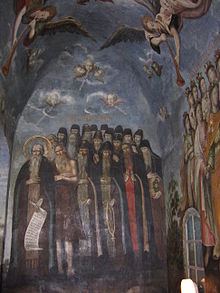

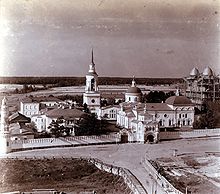


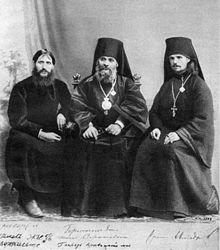



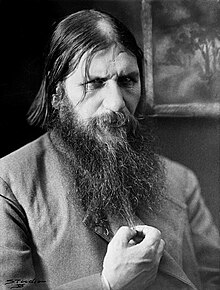


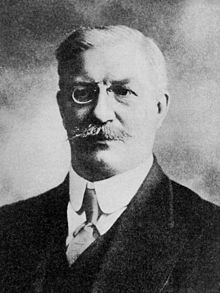

No comments:
Post a Comment